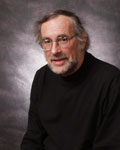Unlike many campus lectures which are largely passive experiences, Wednesday night’s lecture by Professor Emeritus Peter Frederick was abnormally interactive.
The lecture, entitled, "I Pray that you will grow intellectually: Some enduring Themes, Wisdom, and Metaphor from Malcolm X" was the first in what the Malcolm X Institute of Black Studies (MXIBS) plans to be an annual lecture series about the name sake of the institution.
"We want to continue to examine Malcolm X’s life, much like what we do for Martin Luther King Jr., because they are equally important," said Amina McIntyre, Assistant Director of the MXIBS,
 At the start of the lecture, retired Wabash history professor Dr. Peter Frederick mentioned that the date that had been chosen for this occasion was not random. February 21st, 1965 was the date Malcolm X was assassinated. From there, he delved into his material by welcoming the audience into what he called "a three-way conversation with you, me and Malcolm."
At the start of the lecture, retired Wabash history professor Dr. Peter Frederick mentioned that the date that had been chosen for this occasion was not random. February 21st, 1965 was the date Malcolm X was assassinated. From there, he delved into his material by welcoming the audience into what he called "a three-way conversation with you, me and Malcolm."
Speaking on the history of February as Black History Month, Frederick shared that its origins lie in "Negro History Week". The week was set as the second week in February so as to lie between the birthdays of Frederick Douglass and Abraham Lincoln. The genesis into a month as we know it occurred in 1976 as a result of the labors of The Association for the Study of Afro-American Life and History.
The importance of a lecture series about Malcolm X’s life and accomplishments was especially poignant at Wabash, Frederick stressed, because of the presence of the MXIBS. A central question that this lecture series is designed to answer is why the founders of the original organization chose to name it the "Malcolm X Institute" rather than invoking the namesake of other notable civil rights activists who were perhaps less radical or militant.
During the course of the lecture, Frederick played audio of the speeches of El Hajj Malike El-Shabizz, or Malcolm X as we know him, as well as played several video clips of his life. The congregated audience was then continually encouraged to actively participate by leading the course of the discussion about what the clips meant and what significance they still hold today.
When discussing Malcolm’s famous and very public conversion to Islam, Frederick spoke very honestly about this "pre and post Mecca divide." Whereas many like to separate the two and talk about a significant shift between the two periods, Frederick gave another interpretation. "Malcolm post-Mecca was just as crucial, tough and dangerous to American society as he was most pre-Mecca," said Frederick, "There was not as dramatic a change as we would all like to think."
Reflecting after the lecture, Shayne Dube ’09 mentioned his desire that as the lectureship becomes more prominent, it would draw bigger crowds and would contribute more to the sort of renewed academic focus the MXIBS is attempting. "As far as moving forward and redefining the MXIBS with an educational aspect as well as social," he said, "this lecture series goes to support that mission."